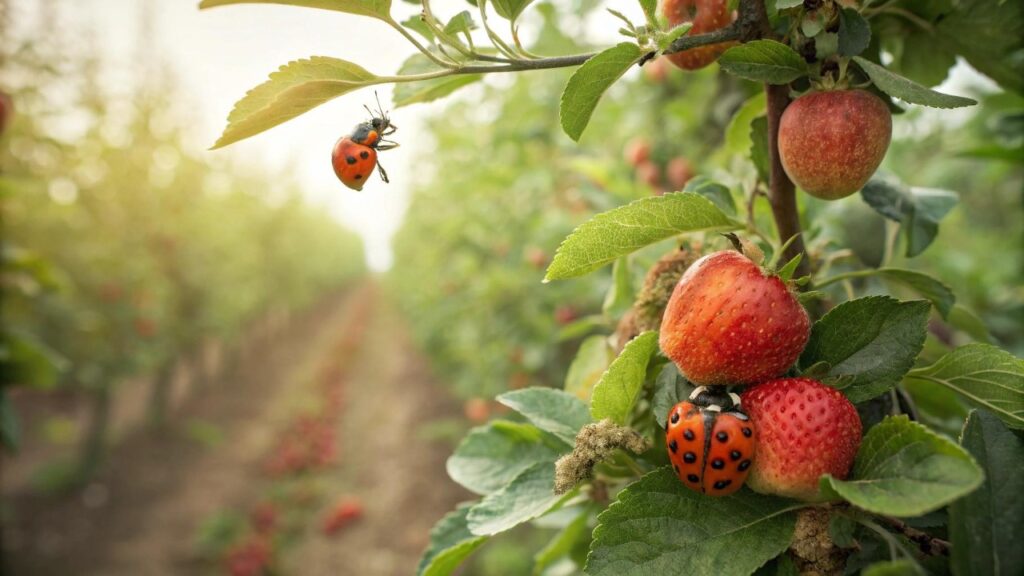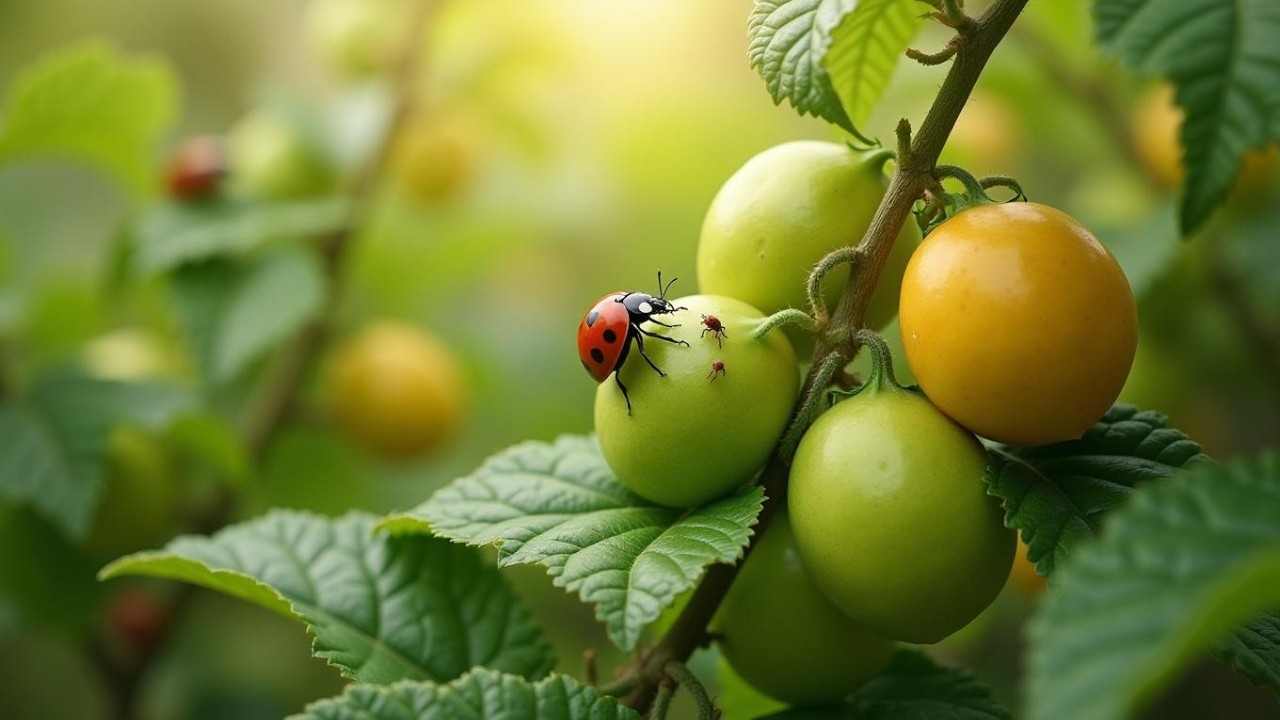Introduction
Frustrating, right? Well, the good news is that organic pest control can save the day without drowning your plants in harmful chemicals. Let’s face it—nothing is more soul-crushing than watching your fruit plants get wrecked by pests. You spend months nurturing your peach trees or apple plants, only to wake up and find aphids throwing a brunch party on your leaves.
Table of Contents
Organic Pest Control for Fruit Plants: Safe and Effective Methods

In this guide, we’ll walk you through safe and effective methods to keep your fruit plants pest-free, from natural insecticides to companion planting hacks and beneficial insects that act like tiny superheroes in your garden. Let’s get those fruit plants thriving again—organically!
What Is Organic Pest Control for Fruit Plants, and How Does It Work?
Organic pest control is all about using natural methods to protect your fruit plants from harmful pests. Instead of relying on synthetic pesticides that can mess with the environment (and your health), organic solutions focus on eco-friendly practices like:
- Natural insecticides made from plant-based ingredients.
- Biological pest control—introducing predator insects like ladybugs and lacewings.
- Physical barriers to keep pests out (like row covers).
- Companion planting to naturally repel pests.
Think of it as giving your garden a holistic makeover that’s gentle on the earth and strong on pest protection.
Are Organic Pest Control Methods as Effective as Synthetic Pesticides?
The short answer: Yes—if you do it right! While synthetic pesticides work fast, they come with a lot of baggage (like killing beneficial insects and contaminating your soil). Organic methods might require a bit more patience, but they’re just as effective with consistent application. Plus, you’ll sleep better knowing your fruits are chemical-free and safe to eat.
Pro Tip: Combine multiple organic strategies for the best results—like using neem oil while encouraging beneficial insects.
Best Organic Pest Control Solutions for Common Fruit Tree Pests
| Pest | Organic Solution | How to Use |
|---|---|---|
| Aphids | Neem Oil, Ladybugs | Spray neem oil; release ladybugs |
| Codling Moths | Pheromone Traps, Kaolin Clay | Disrupt mating cycles; apply kaolin clay as a barrier |
| Caterpillars | Monterey B.t. Biological Insecticide | Spray to target caterpillars and worms |
| Spider Mites | Safer Brand Insect Killing Soap | Spray directly on affected leaves |
| Apple Maggots | Sticky Traps, Kaolin Clay | Place traps; coat fruits with kaolin clay for protection |
How Do I Use Neem Oil Effectively on Fruit Plants?
Ah, neem oil—the MVP of organic pest control. Neem oil is a plant-based oil that’s effective against soft-bodied insects like aphids, whiteflies, and spider mites.
Steps to Use Neem Oil:
- Dilute it: Mix 2 tablespoons of neem oil with 1 gallon of water. Add a few drops of dish soap to help it stick.
- Spray it on: Apply in the early morning or late afternoon to avoid burning your plants. Focus on the undersides of leaves where pests like to hide.
- Repeat weekly until the pests are gone.
Bonus: Neem oil also has antifungal properties, so it can help with powdery mildew and other plant diseases.
Can Companion Planting Help with Pest Control in Fruit Gardens?
Absolutely! Companion planting is like setting up a security system for your fruit plants—without the monthly fees. Certain plants naturally repel pests while others attract beneficial insects.
Top Companion Plants for Fruit Gardens:
- Marigolds: Keep aphids and nematodes away.
- Basil: Repels flies and mosquitoes (and tastes great in your pesto!).
- Chives: Help deter Japanese beetles and carrot flies.
- Nasturtiums: Act as a trap crop for aphids, luring them away from your fruit plants.
Benefits of Using Beneficial Insects Like Ladybugs and Lacewings
Introducing beneficial insects into your garden is like hiring a team of bodyguards for your plants. Ladybugs, lacewings, and parasitic wasps target specific pests and keep your garden healthy.
Ladybugs: Natural predators of aphids, spider mites, and mealybugs. Release them at dusk for the best results.
Lacewings: Known as “aphid lions,” they devour aphids and other soft-bodied insects.
Parasitic Wasps: Target caterpillars and moth larvae—great for controlling codling moths.
How Often Should I Apply Organic Sprays to My Fruit Trees?
It depends on the type of spray and the severity of the infestation. As a general rule:
- Neem Oil: Once a week until the pest problem is under control.
- Horticultural Oil: Apply during the dormant season to smother overwintering pests.
- B.t. (Bacillus thuringiensis): Reapply after rain or every 7–10 days.
Consistency is key—don’t expect a one-and-done solution. Stay vigilant and adjust your schedule based on your garden’s needs.
Specific Organic Pest Control Methods for Different Types of Fruit Plants
| Fruit Plant | Common Pests | Organic Solutions |
|---|---|---|
| Apple Trees | Codling Moth, Apple Maggots | Pheromone Traps, Kaolin Clay, B.t. |
| Peach Trees | Peach Twig Borer | Spinosad, Horticultural Oil |
| Citrus Trees | Citrus Leafminer | Neem Oil, Beneficial Nematodes |
Conclusion
Keeping your fruit plants safe from pests doesn’t have to involve a chemistry lab of synthetic sprays. With organic pest control methods, you can protect your garden naturally while keeping your fruits safe and delicious.
Whether it’s applying neem oil, releasing a squad of ladybugs, or using companion planting, the key is consistency and observation. Your fruit garden will thank you for it!
Ready to transform your garden? Try one of these organic methods today and watch your fruit plants thrive.



